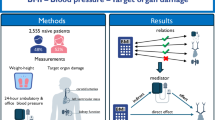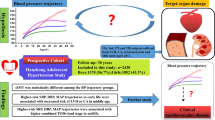Abstract
Differences between male and female subjects in mean 24 h blood pressure (BP) values and target organ damage such as left ventricular mass (LVMASS) and intima–media thickness (IMT) of carotid arteries were explained. The study population consisted of 1445 subjects. All subjects underwent 24 h ambulatory BP monitoring, left ventricular echocardiography and measurement of IMT of carotid arteries. Men and women did not differ in age, body mass index (BMI) and clinic BP values. Mean 24 h systolic and diastolic BP were significantly higher in men compared to women. LVMASS corrected for body surface area or height2.7, IMT of common (MCCA) and internal (MICA) carotid arteries were found to be significantly higher in men compared to women. Analysis of covariance showed that men had significantly higher LVMASS, MCCA and MICA than women, after adjustment for BMI, age, smoking status, mean 24 h systolic and diastolic BPs, fasting serum glucose, total cholesterol and triglycerides. These findings indicate that male sex could be an important predictor of higher mean 24 h BP and target organ damage for subjects of similar BMI and clinic BP values.
This is a preview of subscription content, access via your institution
Access options
Subscribe to this journal
Receive 12 digital issues and online access to articles
$119.00 per year
only $9.92 per issue
Buy this article
- Purchase on SpringerLink
- Instant access to full article PDF
Prices may be subject to local taxes which are calculated during checkout




Similar content being viewed by others
References
World Population Data Sheet. Population Reference Bureau: Washington, DC, 2002.
The World Health Report. World Health Organization: Geneva, 2002.
Liu P, Death A, Handelsman D . Androgens and cardiovascular disease. Endocrine Rev 2003; 24: 313–340.
Kromhout D, Menotti A, Keseloot H, Sans S . Prevention of coronary heart disease by diet and lifestyle: evidence from prospective cross-cultural, cohort, and intervention studies. Circulation 2002; 105: 893–898.
Barrett-Connor E . Sex differences in coronary heart disease. Why are women so superior? The 1995 Ancel Keys Lecture. Circulation 2002; 95: 252–264.
Antonicelli R, Gesuita R, Paciaroni E . Sexual dimorphism in arterial hypertension: an related phenomenon. Arch Gerontol Geriatr 2000; 29: 283–289.
Burt VL, Whelton P, Roccella EJ, Brown C, Cutler JA, Higgins M et al. Prevalence of hypertension in the US adult population: results from the Third National Health and Nutrition Examination Survey, 1988–1991. Hypertension 1995; 25: 305–313.
Wiinber N, Hoegholm A, Christensen HR, Bang LE, Mikkelsen KL, Nielsen PE et al. 24-h ambulatory blood pressure in 352 normal Danish subjects, related to age and gender. Am J Hypertens 1995; 8: 978–986.
Khoury S, Yarows SA, O'Brien TK, Sowers JR . Ambulatory blood pressure monitoring in a nonacademic setting: effects of age and sex. Am J Hyperten 1992; 5: 616–623.
Pickering TG . White-coat hypertension. Curr Opin Nephrol Hypertens 1996; 5: 192–198.
Gualdiero P, Niebauer J, Addison C, Clark SJ, Coats AJ . Clinical features, anthropometric characteristics, and racial influences on the ‘white-coat effect’ in a single cohort of 1553 concecutive subjects undergoing routine ambulatory blood pressure monitoring. Blood Press Monit 2000; 5: 53–57.
Zakopoulos NA, Kotsis VT, Pitiriga VC, Toumanidis ST, Lekakis JP, Nanas SN et al. White coat effect in normotension and hypertension. Blood Press Monit 2002; 7: 1–6.
Zakopoulos NA, Nanas SN, Lekakis JP, Vemmos KN, Kotsis VT, Pitiriga VC et al. Reproducibility of ambulatory blood pressure measurements in essential hypertension. Blood Press Monit 2001; 6: 41–45.
Zakopoulos NA, Kotsis VT, Gialafos EJ, Papamichael CM, Pitiriga VCh, Mitsibounas DN et al. Systemic sclerosis is not associated with clinic or ambulatory blood pressure. Clin Exp Rheumatol 2003; 21: 199–204.
Zakopoulos N, Papamichael C, Papaconstantinou H, Dubbins PA, Burrell CJ, Lekakis J et al. Isolated clinic hypertension is not an innocent phenomenon. Effect on the carotid artery structure. Am J Hypertens 1999; 12: 245–250.
Kotsis V, Stabouli S, Bouldin M, Low A, Toumanidis S, Zakopoulos N . Impact of obesity on 24-h ambulatory blood pressure and hypertension. Hypertension 2005; 45: 602–607.
Zakopoulos NA, Tsivgoulis G, Barlas G, Papamichael C, Spengos K, Manios E et al. Time rate of blood pressure variation is associated with increased common carotid artery intima–media thickness. Hypertension 2005; 45: 505–512.
Kotsis V, Pitiriga V, Stabouli S, Papamichael C, Toumanidis S, Rokas S et al. Carotid artery intima–media thickness could predict the presence of coronary artery lesions. Am J Hypertens 2005; 18: 601–606.
Sahn PS, De Maria A, Kisslo J, Weyman A . The Committee on the M-mode standardization of the American Society of Echocardiography results of a survey of echocardiographic measurements. Circulation 1978; 58: 1072–1083.
Devereux RB, Alonso DR, Lutas EM, Gottlieb GJ, Campo E, Sachs I et al. Echocardiographic assessment of left ventricular hypertrophy. Comparison to necropsy findings. Am J Cardiol 1986; 57: 450–458.
Sass C, Herbeth B, Chapet O, Siest G, Visvikis S, Zannad F . Intima–media thickness and diameter of carotid and femoral arteries in children, adolescents and adults from the Stanislas cohort: effect of age, sex, anthropometry and blood pressure. J Hypertens 1998; 16: 1593–1602.
Veller MG, Fisher CM, Nicolaides AN, Renton S, Geroulakos G, Stafford NJ et al. Measurement of the ultrasonic intima–media complex thickness in normal subjects. J Vasc Surg 1993; 17: 719–725.
James EM, Earnest F, Forbes GS, Reese DF, Houser OW, Folger WN . High resolution dynamic ultrasound imaging of the carotid bifurcation; a prospective evaluation. Radiology 1982; 144: 853–858.
Mancia G, Parati G . Ambulatory blood pressure monitoring and organ damage. Hypertension 2000; 36: 394–399.
Imai Y, Ohkubo T, Sakuma M, Tsuji I, Satoh H, Nagai K et al. Predictive power of screening blood pressure, ambulatory blood pressure and blood pressure measured at home for overall and cardiovascular mortality: a prospective observation in a cohort from Ohasama, northern Japan. Blood Press Monit 1996; 1: 251–254.
Stepson JA, Thijs L, Fagard R, O'Brien ET, Clement D, De Leeuw PW et al. Predicting cardio-vascular risk using conventional vs ambulatory blood pressure in older patients with systolic hypertension. JAMA 1999; 282: 539–546.
Khattar RS, Swales JD, Banfield A, Dore C, Senior R, Lahiri A . Prediction of coronary and cerebrovascular morbidity and mortality by direct continuous arterial blood pressure monitoring in essential hypertension. Circulation 1999; 100: 1071–1076.
Robinson TG, Dawson SL, Ahmed U, Manktelow B, Fotherby MD, Potter JF . Twenty-four hour systolic blood pressure predicts long-term mortality following acute stroke. J Hypertens 2001; 19: 2127–2134.
Mancia G, Zanchetti A, Agabiti-Rosei E, Benemio G, De Cesaris R, Fogari R et al. Ambulatory blood pressure is superior to clinic blood pressure in predicting treatment induced regression of left ventricular hypertrophy. Circulation 1997; 95: 1464–1470.
Mancia G, Sega R, Bravi C, De Vito G, Valagussa F, Cesana G et al. Ambulatory blood pressure normality: results from the PAMELA study. J Hypertens 1995; 13: 1377–1390.
Guidelines Sub-Committee. 1999 World Health Organization/International Society of Hypertension Guidelines for the management of hypertension. J Hypertens 1999; 17: 151–183.
Elhendy A, Modesto KM, Mahoney DW, Khandheria BK, Seward JB, Pellikka PA . Prediction of mortality in patients with left ventricular hypertrophy by clinical, exercise stress, and echocardiographic data. J Am Coll Cardiol 2003; 41: 129–135.
Sachs RN, Valensi P, Lormeau B, Taupin JM, Nitenberg A, Metz D et al. Determinants of echocardiographically measured left ventricular mass in diabetic patients with or without silent myocardial ischaemia. Diabetes Metab 1999; 25: 128–136.
Ghali JK, Liao Y, Cooper RS . Influence of left ventricular geometric patterns on prognosis in patients with or without coronary artery disease. J Am Coll Cardiol 1998; 31: 1635–1640.
Okin PM, Roman MJ, Schwartz JE, Pickering TG, Devereux RB . Relation of exercise-induced myocardial ischemia to cardiac and carotid structure. Hypertension 1997; 30: 1382–1388.
Tsang TS, Barnes ME, Gersh BJ, Takemoto Y, Rosales AG, Bailey KR et al. Prediction of risk for first age-related cardiovascular events in an elderly population: the incremental value of echocardiography. J Am Coll Cardiol 2003; 42: 1199–1205.
Liu JE, Robbins DC, Palmieri V, Bella JN, Roman MJ, Fabsitz R et al. Association of albuminuria with systolic and diastolic left ventricular dysfunction in type 2 diabetes: the Strong Heart Study. J Am Coll Cardiol 2003; 41: 2022–2028.
Meyer R, Linz KW, Surges R, Meinardus S, Vees J, Hoffmann A et al. Rapid modulation of L-type calcium current by acutely applied estrogens in isolated cardiac myocytes from human, guinea-pig and rat. Exp Physiol 1998; 83: 305–321.
Hayward CS, Webb CM, Collins P . Effect of sex hormones on cardiac mass. Lancet 2001; 357: 1354–1356.
Armentano R, Graf S, Barra J, Velikovsky G, Baglivo H, Sánchez R et al. Carotid wall viscosity increase is related to intima–media thickening in hypertensive. Patients Hypertens 1998; 31: 534.
Muiesan ML, Pasini G, Salvetti M, Calebich S, Zulli R, Castellano M et al. Cardiac and vascular structural changes. prevalence and relation to ambulatory blood pressure in a middle-aged general population in northern italy: the vobarno study. Hypertension 1996; 27: 1046–1052.
Bots ML, Breslau PJ, Briet E, de Bruyn AM, van Vliet HH, van den Ouweland FA et al. Cardiovascular determinants of carotid artery disease. The Rotterdam elderly study. Hypertension 1992; 19: 717–720.
Ghiadoni L, Taddei S, Virdis A, Sudano I, Legge V, Meola M et al. Endothelial function and common carotid artery wall thickening in patients with essential hypertension. Hypertension 1998; 32: 25–32.
Tang R, Hennig M, Thomasson B, Scherz R, Ravinetto R, Catalini R et al. Baseline reproducibility of B-mode ultrasonic measurement of carotid artery intima–media thickness: the European Lacidipine Study on Atherosclerosis (ELSA). J Hypertens 2000; 18: 197–201.
Blacher J, Guerin A, Pannier B, Marchais S, London G . Arterial calcifications, arterial stiffness, and cardiovascular risk in end-stage renal disease. Hypertension 2001; 38: 938–942.
Bortolotto L, Hanon O, Franconi G, Boutouyrie P, Legrain S, Girerd X . The aging process modifies the distensibility of elastic but not muscular arteries. Hypertension 1999; 34: 889–892.
Ebrahim S, Papacosta O, Whincup P, Wannamethee G, Walker M, Nicolaides AN et al. Carotid plaque, intima–media thickness, Cardiovascular risk factors, and prevalent cardiovascular disease in men and women. Stroke 1999; 30: 841–850.
Cupini LM, Pasqualetti P, Diomedi M, Vernieri F, Silvestrini M, Rizzato B et al. Carotid artery intima–media thickness and lacunar versus nonlacunar infarcts. Stroke 2002; 33: 689–694.
Hulthe J, Wikstrand J, Emanuelsson H, Wiklund O, de Feyter PJ, Wendelhag I . Atherosclerotic changes in the carotid artery bulb as measured by B-mode ultrasound are associated with the extent of coronary atherosclerosis. Stroke 1997; 28: 1189–1194.
Okin P, Roman M, Schwartz J, Pickering T, Deveraud R . Relation of excercise-induced Myocardial ischemia to cardiac and carotid structure. Hypertension 1997; 30: 1382–1388.
Salonen JT, Salonen R . Ultrasonographically assessed carotid morphology and the risk of coronary heart disease. Arterioscler Thromb 1991; 11: 1245–1249.
Author information
Authors and Affiliations
Corresponding author
Rights and permissions
About this article
Cite this article
Kotsis, V., Stabouli, S., Pitiriga, V. et al. Impact of gender on 24-h ambulatory blood pressure and target organ damage. J Hum Hypertens 20, 658–665 (2006). https://doi.org/10.1038/sj.jhh.1002047
Received:
Revised:
Accepted:
Published:
Issue date:
DOI: https://doi.org/10.1038/sj.jhh.1002047
Keywords
This article is cited by
-
Sustained high blood pressure and 24-h ambulatory blood pressure monitoring in Tanzanian adolescents
Scientific Reports (2021)
-
Efficacy and safety of olmesartan medoxomil plus amlodipine in age, gender and hypertension severity defined subgroups of hypertensive patients
Journal of Human Hypertension (2011)
-
Detecting white coat and reverse white coat effects in clinic settings using measures of blood pressure habituation in the clinic and patient self-monitoring of blood pressure
Journal of Human Hypertension (2007)
-
Serum uric acid, the endothelium and hypertension: an association revisited
Journal of Human Hypertension (2007)



